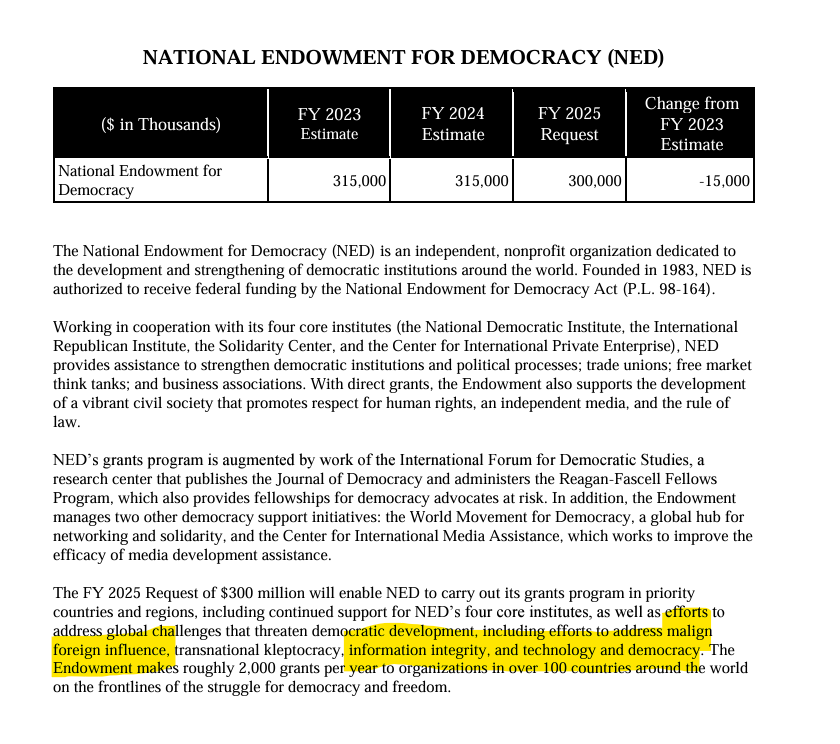by Oscar Buynevich
The National Endowment for Democracy (NED) has – since at least 2021 – failed to comply with transparency requirements regarding the more than $300 million of taxpayer funding it receives from the U.S. Department of State, potentially violating federal regulations under 22 CFR 67.4 and the Federal Funding Accountability and Transparency Act (FFATA).
In recent years, NED failed to take any corrective action regarding failures to report their grantmaking activities publicly. NED’s Financial Report for FY23 reveals that NED and Department of State Bureau of Democracy, Human Rights, and Labor (DRL) leadership assessed these transparency failures to “determine a long-term resolution.”
The financial report further reveals NED did not face accountability from the federal government for transparency failures. In fact, they were awarded a special authorization from the State Department to hide their taxpayer spending trail. The Endowment’s management entered a legally questionable agreement with their Department of State Grants Officer to designate their entire 2024 federal appropriation as “sensitive.” The designation allows NED to bypass its legal obligation to operate transparently and effectively conceals all State Department-funded activities through NED from public scrutiny.
This cloud of secrecy obscures the operations of a government cutout that is deeply involved in government-backed censorship operations, and has long been characterized as a successor to the CIA of the 1960s and 70s. Indeed, according to its own founder, NED performs the same regime-change and foreign influence operations that were once the purview of the CIA. The New York Times described NED’s role as “influencing domestic politics abroad” and “do[ing] n the open what the Central Intelligence Agency has done surreptitiously for decades.”
NED was originally founded in 1983 as “an independent, non-governmental nonprofit grantmaking Foundation dedicated to strengthening democracy abroad.” On the organization’s “About” page, it touts that it is “a unique institution” and that its “nongovernmental character gives it a flexibility” so that it can “respond quickly when there is an opportunity for political change.”
The activities of this foreign-focused “quasi-autonomous NGO” have in recent years boomeranged back against Americans, with longtime former NED officials, and NED-funded organizations and initiatives contributing to the censorship of Americans’ online speech. What’s more, NED’s support for the censorship of “disinformation” in foreign countries has contributed to blowback against American companies, notably Meta’s WhatsApp and X in Brazil.
NED focus on online information control shows no signs of stopping. The State Department’s Congressional budget justification for FY25 highlights several NED priorities that are buzzwords for censorship: “information integrity,” “technology and democracy,” and countering “malign foreign influence.”

A $315 Million Black Hole of Federal Funding
With a budget that had steadily risen over the past two decades, including a massive two-thirds increase passed by the U.S. Congress in 2020, the amount of U.S. taxpayer money accounted for by NED now stands at an all-time high of $315 million.
As the recipient of congressionally appropriated funding, NED should be compliant with transparency and oversight regulations requiring it to report on its activities, including the following:
- 22 CFR 67.4: “As a recipient of congressionally appropriated funds, NED has a special responsibility to: (i) Operate openly, (ii) Provide relevant information on programs and operations to the public, and (iii) Ensure that funds are spent wisely, efficiently, and in accordance with all relevant regulations.”
- 22 USC 4414: Requirements relating to the Endowment and its grantees: b) Consultation with Department of State: “The Endowment shall consult with the Department of State on any overseas program funded by the Endowment prior to the commencement of the activities of that program.”
More broadly, as an organization in receipt of annual taxpayer funding, NED should be subject to the Federal Funding Accountability and Transparency Act (FFATA), which requires that information about Federal spending be posted on a single, searchable website. For example, if NED used government funds to support censorship efforts in Brazil, or organizations that support the EU’s pro-censorship regulatory regime, the Digital Services Act, FFATA would ordinarily require it to report on these activities. Grantmaking nonprofits like NED are typically required by their awarding agency to report the grantees of their federal funding to the public through usaspending.gov, the federal government’s open source spending database.
Yet NED has been able to skirt these requirements. As mentioned in their annual financial reports, since 2021 independent audits of NED have consistently found “Noncompliance with Rules and Regulations with regards to Reporting Requirements under the Federal Funding Accountability and Transparency Act (FFATA).”
In response to auditors finding noncompliance with federal reporting requirements, NED management claimed its secrecy was necessary for the protection of some of its overseas partners, a standard which it swiftly applied to more than 700 grants worldwide:
“As NED management stated in response to the FY 21 audit, in 2015, [The Department of State] offered NED the option of case‐by‐case waivers of individual subgrantees, rather than a per‐country or blanket waiver of subgrantees which would have allowed for a practicable solution to meet the reporting requirements. In response and with notice to DOS, NED proposed and implemented an alternate method of compliance by posting information about subrecipients and funded programs on a searchable online database with content controlled by NED, with anonymized records for sensitive programs. This flexibility is essential to NED’s sensitive grantmaking program, where we often must make quick adjustments to anonymize information when partners face new risks in their operating environment. In total, NED currently has more than 700 grants in 50 countries requiring special protection of grantee identities.”
As the above section shows, NED even rebuffed a State Department offer to review its grants on a case-by-case basis to determine which ones could be released to the public. It instead was given the ability to control grantee information through its own searchable database for several years – a database The Endowment stopped updating in 2021 and at the time of writing has been scrubbed, only accessible through archive websites.

In a 2023 statement regarding its noncompliance with FFATA reporting requirements, NED falsely claimed that the transparency requirements clashed with the independence promised to NED in the legislative Act which created it.
“NED management has been aware of the FFATA reporting requirements and takes a serious approach to FFATA regulations. NED’s concerns regarding FFATA compliance are rooted in concern for personal and physical safety of our grantees working in the sphere of human rights and democracy, particularly those NED partners working in the world’s most hostile authoritarian countries. As stated in our response to the FY2022 Audit, NED staff analysis of the potential reporting requirements recognized two significant risks to NED’s partners and the success of its programs: 1) reporting all first-tier sub awardees would mean posting the identity of recipients and details of sensitive awards on a publicly accessible website, and 2) reporting NED partners as first-tier sub awardees of the Department of State (DOS) on a public website of federal funding accountability undermines the Congress’ intentional decision to protect the independence of NED’s programmatic decision-making when it crafted the NED Act.“
Yet 22 CFR 67.4, which specifically applies to NED, requires the organization to “operate openly” and “provide relevant information on programs and operations to the public.”
“With the intention of balancing the legitimate concerns for our NED grantees with our desire to comply with the spirit of transparency and accountability rooted in FFATA, NED renewed discussions with Department of State officials to find a resolution to this issue. The leadership at NED and at State’s Bureau of Democracy, Human Rights, and Labor jointly assessed the issue to determine a long-term resolution.
Following the development of a Duty of Care policy outlining NED’s institutional obligations to “do no harm” with respect to the safety and security of our stakeholders, including NED grantees, NED management has since reached an agreement with our DOS Grants Officer to designate NED’s annual appropriation award as “sensitive” and therefore not subject to the annual FFATA reporting requirements. We have since received NED’s annual award for 2024 with the language matching several of our special funds DOS awards: “This award has been deemed sensitive and is not subject to the Federal Funding Accountability and Transparency Act (FFATA).” We expect the same terms to apply to our awards going forward, ensuring a permanent resolution to this issue.”
With the last line, NED makes its intentions plain: It expects to operate in the dark and never be subject to transparency requirements ever again. What’s more, it wants all its activities to be hidden behind a veil of secrecy – it does not accept that security risks to grantees could be assessed by the State Department on a case-by-case basis.
– – –
Oscar Buynevich is an investigator at Foundation for Freedom Online.
Image “National Endowment for Democracy Front Office” by National Endowment for Democracy.





